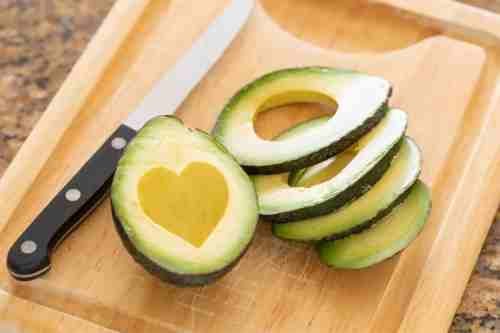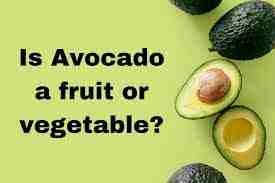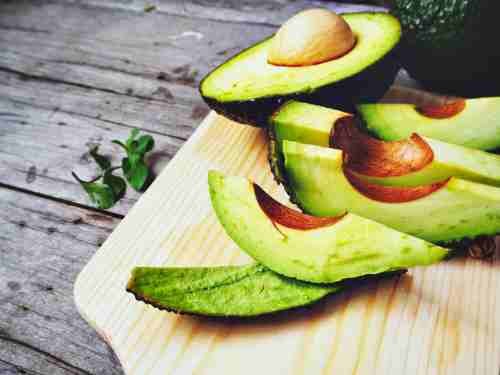Avocados are adored around the globe due to their healthy and delicious food items, which can be found at cafes and in kitchens around the world. The average Avocado, which is 1/3 of it, is packed with more than 20 nutrients and vitamins! Despite all the hype about avocado toasts and smoothies, There is still a debate over whether avocados count as an actual fruit or vegetable.
In this post, we’ll discuss the distinctions between fruits and vegetables. Then, we’ll determine the difference between an avocado being a vegetable and a fruit. Additionally, we’ll look at some interesting information about avocados.
What is the distinction between fruits and vegetables?

Before answering the issue “Is avocado an edible or a vegetable?” it’s important to know the distinction between fruits and vegetables. One of the first things you must be aware of is that two types of classification exist: culinary and botanical. However, here’s an interesting surprise: One plant can be classified as the fruit of one classification and a vegetable in a different!
For it to qualify as botanical fruit, that is, it must have seeds that are derived from the flowers of the plant. This is why apples, plums and grapes are all fruit. But, every other component of the plant — like stems, leaves and roots — are vegetables. Consider the spinach (leaves) and celery (stems) and the carrots (roots). When categorizing vegetables and fruits in the kitchen, the focus is on flavour. They are thought of as having an acidic or sweet flavour, making them excellent sauces or desserts. The flavour of vegetables is savoury, and they are often served as meals or even as the centrepiece of a main dish.
Bell peppers, for instance, are technically considered to be fruits (because they’re a source of seeds derived from flowers). Some may taste sweet when consumed in raw form. However, in the context of food, it’s considered a vegetable stuffed with rice and beef or as a crunch to salads or stir-fry.
What is your favourite fruit or vegetable?

Avocado is a fruit.
Botanists define it as a huge fruit with one seed.
Though it’s not quite as sweet as other fruit, it comes into the category of fruits as “the fruit that is sweet and fleshy from a tree or plant with seeds that is edible as a food”.
Avocados can be found on trees in warm climates. They are indigenous to Mexico. They are a soft velvety texture. They have an oversized, dense skin that is dark green or blackish.
Half a small or 1/3 of an avocado medium (50 grams) can be considered a serving. It is a source of 84 calories, a great source of good fats and nutrients and can provide various benefits to your health.
Are Avocados Drupes or Berries?
It is well-known that avocados are one of the most popular fruits from a botanical perspective. However, you may be amazed by this second definition: Technically speaking, it is the fruit. That’s right!
A fleshy fruit should be a single flower and possess at minimum one seed to make it the term “berry. But most berries, such as raspberries and grapes, contain several seeds. The Avocado’s seeds are located within the pit located inside the fruit. It is possible to turn the seed into your avocado tree if your region is in the right conditions. Avocados are missing from the top list of indoor fruit trees. I’m sorry for apartment dwellers!
While avocado varieties differ in size and shape from egg-sized chickens to gigantic four-pound ones, they All have similar characteristics to berries! Certain may even change colour as they mature, whereas others display a rich purple hue. The Hass avocado, a wonderful combination of Mexican and Guatemalan avocados, is the most well-known kind of Avocado found in supermarkets in the United States. It is a truth that Guatemala and Mexico are the two countries with a great selection of avocados, which isn’t just a coincidence.
Avocados are a good source of nutrition.
In addition to their delightful flavour, the health benefits of avocados make them a hit. As a savoury fruit, Avocados can be used in a variety of ways to use in a variety of recipes so that you can have them all the time.
Healthy avocados provide 5 g of monounsaturated fat and one G of polyunsaturated fat per 50 grams of serving (one-third of an avocado medium). More than 75% of the Avocado’s fat is unsaturated. This makes it an ideal replacement for foods that contain saturated fats. As per the Dietary Guidelines for Americans, substituting trans fats with unsaturated oils will lower bad cholesterol levels in the blood.
Avocados provide sodium and cholesterol non-processed alternatives to processed food. Healthy avocados are a great supply of five important nutrients: folate, fibre and Vitamin K, Pantothenic acids, and copper. They provide nearly 20 minerals, vitamins, and phytonutrients and are an excellent source of healthy fats (6 grams per 50 g serving). Avocados are a great and healthy addition to your food plan.
What Does Avocado Taste Like?
Avocados are a sweet and creamy texture. They also have a nutty and mild taste.
The different types of Avocados
The Hass Avocado is the more well-known type and can be found in many supermarkets. However, there are around 500 varieties of avocados that vary in both size and colour. Certain varieties with bright green skins, while others have skins with black, some are smooth-textured, and the skins of other varieties have bumpy and rough skins. They’re smooth in texture and have a light, almost bitter taste.
Bacon: They are mildly flavoured, and they have the appearance of thin, smooth skin that is topped with yellow-green flesh.
Cocktails: This smaller fruit, also known as Fuerte avocados, is picked in the two to three inches length range. They look like pickles and are characterized by emerald green, dark-coloured skin.
Fuerte: They are shapeless pears with a light flavour and an extremely high amount of water. They feature fine, smooth skin.
Gwen Gwen to Hass avocados, both in flavour and texture. They’re smaller and have oval-shaped shapes and rough and green skin. They also have soft flesh.
Hass, The variety of avocados, is by far the most popular type. The dark-skinned, bumpy-textured California cultivar has more fat (the quality type) than the more vibrant, smooth, green variety grown in Florida.
Lula (also known as Lulu) Lula : (also known as Lulu) fruits are mostly grown in Texas.
Pinkerton: contains light, cream-coloured flesh and is very easy to remove.
Zutano: The Zutano has moderate flavour, with an attractive yellow-green, shiny skin.
How do you eat AVOCADO?
Avocados are typically eaten raw but can also be cooked. They may be cut into pieces, diced or crushed when eating them in raw form. It is also possible to blend them in creamy salad dressings and smoothies. After cooking, they may be added to recipes like sauces, soups, and casseroles.
For avocado lovers, I would like to make it easy and enjoy it with toast and sea salt in a sushi roll, a guacamole-like guacamole mix, or a vegetable sandwich.
ARE AVOCADOS GOOD FOR YOU?
Yes! Avocado is a nutritious food. They’re high in monounsaturated fats that have been proven beneficial for your heart. They also include vitamin C as well as vitamin B6, as well as potassium.
A “good fat” amount in avocados indicates that they’ll keep you full. Avocados are better than refined fats, such as oils, since they’re full of vitamin A, fibre, and minerals.
What are the health benefits of Avocado?
Avocados are regarded as an excellent food due to their high content of nutrients and their long list of benefits for health. They are a good source of fibre, healthy fats, minerals, and vitamins. Below are a few health benefits that come from avocados.
Heart Health
The results of studies have shown that polyunsaturated and monounsaturated fats found in avocados can benefit cardiovascular health. These fats aid in decreasing cholesterol levels and inflammation and increase the likelihood of suffering from heart disease.
Weight Loss
The high fibre content in avocados makes you feel full and satisfied after eating. It also reduces the likelihood of eating too much and snacking between meals; they help in weight loss.
Digestive Health
Avocados are a great source of fibre. This is vital for maintaining a healthy digestive tract. In addition, digestive disorders like constipation tend to be less frequent due to the fibre’s ability to ensure that your digestive system functions properly.
Antioxidants
Avocados are a great source of vitamin E which is an antioxidant. It can protect your skin from the oxidative damage caused by free radicals. Research has shown that vitamin E aids in improving skin health and diminishing the signs of aging.
Lutein and Zeaxanthin, essential antioxidants to eye health, can be found abundantly in avocados. There is evidence that these antioxidants can decrease the chance of macular degeneration and cataracts.
The reduction in inflammation
Carotenoids, anti-inflammatory compounds and phytosterols can be found in avocados. These compounds aid in reducing inflammation. This could reduce the likelihood of developing chronic illnesses such as cancer, diabetes or heart problems.
Avocados are loaded with fats that can assist the body’s ability to absorb fat-soluble vitamins, such as A, D, E, and K. It is possible to increase the intake of these essential vitamins by including avocados in your diet.
Avocados are rich in nutrients and have a myriad of health benefits. They contain a lot of healthy fats, fibre, and a range of minerals and vitamins. Consuming avocados may help in losing weight, digestive health, eye and skin health, cardiovascular health, inflammation management and absorption of nutrients.
Do you need to refrigerate avocados?
Ripe avocados are best kept in a refrigerator, where they reduce the time taken to ripen process. To prevent an avocado cut from becoming brown, take out the seeds and coat the flesh with cooking spray or citrus juice and then wrap it with plastic wrap, and then store it in the refrigerator, where it will last for up to three days.
Can You Freeze Avocados?
Yes. Avocados can be frozen. Freezing avocados is an excellent option to ensure you keep them in your fridge. But they are only a substitute for fresh avocados in some recipes. The frozen avocados can be used for smoothies, toast (avocado toast) and mashed into Guacamole.
How to Freeze These
Slice them into half or slices, then remove the skin and seed. Pour lemon juice into the flesh. Place the pieces into an airtight container. Freeze. The pieces should last up to four months when stored in the freezer. Pull the frozen items from the freezer when you are ready to defrost them. Then put the container in an airtight place on the kitchen counter. Set them aside for 30 minutes or more to return to room temperature.
